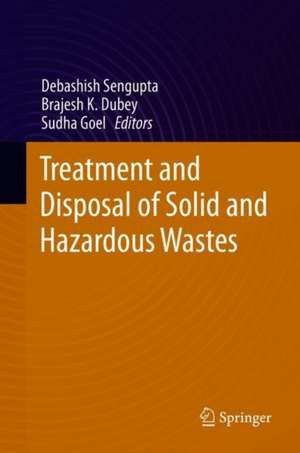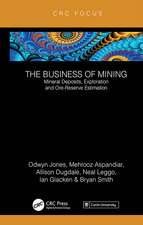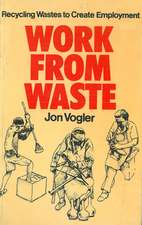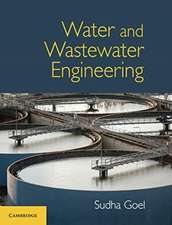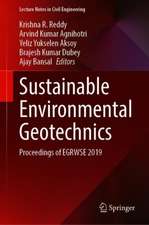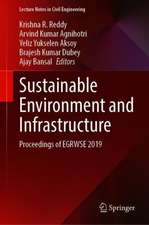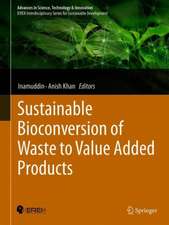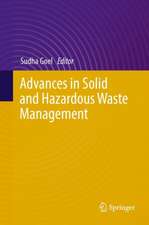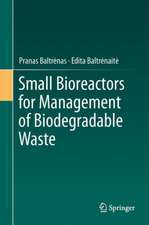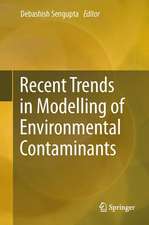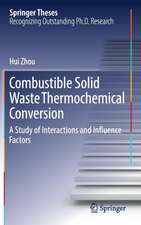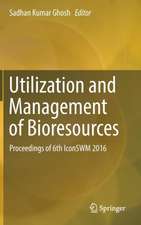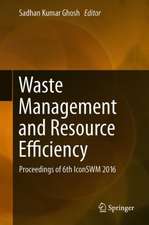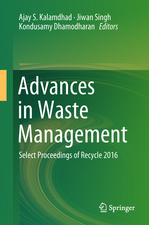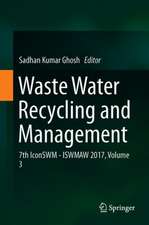Treatment and Disposal of Solid and Hazardous Wastes
Editat de Debashish Sengupta, Brajesh K. Dubey, Sudha Goelen Limba Engleză Hardback – 14 mar 2022
This book presents numerous examples and case studies of innovative tools, treatment methods and applications in this growing area of research and development. It describes in detail laboratory methods of measuring the biodegradation of specific organic fractions, like floral waste, and also discusses the treatment of yard and food waste by anaerobic digestion and landfill leachate using constructed wetlands. Case studies are provided that show how remote sensing (RS) and GIS were used to develop an integrated solid waste management plan for a city and to evaluate the environmental impacts of stone quarrying activities.
The book also features chapters discussing the implications of natural radioactivity in beach placers and their impact on groundwater and other parts of the environment, as well as the twelve principles of green chemistry and their application in the reuse and recycling of solid waste. Moreover, it includes examples of waste to energy, like refuse derived fuel and biofuel generation and an evaluation of their potential, and covers topics such as life cycle assessment as a tool for developing integrated solid waste management systems and an overview of municipal solid waste management rules, illustrating the importance of technological inputs in the development of regulatory frameworks.
Written by leading practitioners and scholars in the field, the book enables readers to understand and apply these principles and practices in their endeavours.
Preț: 787.01 lei
Preț vechi: 959.76 lei
-18% Nou
Puncte Express: 1181
Preț estimativ în valută:
150.61€ • 156.66$ • 124.34£
150.61€ • 156.66$ • 124.34£
Carte disponibilă
Livrare economică 24 martie-07 aprilie
Preluare comenzi: 021 569.72.76
Specificații
ISBN-13: 9783030296421
ISBN-10: 3030296423
Pagini: 236
Ilustrații: IX, 236 p. 1 illus.
Dimensiuni: 155 x 235 mm
Greutate: 0.59 kg
Ediția:1st ed. 2022
Editura: Springer International Publishing
Colecția Springer
Locul publicării:Cham, Switzerland
ISBN-10: 3030296423
Pagini: 236
Ilustrații: IX, 236 p. 1 illus.
Dimensiuni: 155 x 235 mm
Greutate: 0.59 kg
Ediția:1st ed. 2022
Editura: Springer International Publishing
Colecția Springer
Locul publicării:Cham, Switzerland
Cuprins
1. Biodegradation of Floral Waste under Aerobic Conditions with Different Microbial Inocula and Aeration Methods.- 2. The Treatment of Landfill Leachate and Other Wastewaters Using Constructed Wetlands .- 3. Occurrence of Natural Radioactivity, its Elevated Levels in Ground Water and Implications.- 4. Refuse Derived Fuel (RDF) Production and Utilisation Potential from Municipal Solid Waste (MSW) in India.- 5. Impact of Sandstone Quarrying on the Health of Quarry Workers and Local Residents: A Case Study of Keru, Jodhpur, India.- 6. Incorporation of Life Cycle Thinking in Development of Integrated Solid Waste Management Systems.- 7. Reuse and Recycle: A Green Chemistry Approach.- 8. An Integrated Solid Waste Management (ISWM) Plan Using Google Earth and Linear Programming: A Case Study of Kharagpur City, West Bengal.- 9. Optimization of F/M Ratio during Anaerobic Codigestion of Yard Waste with Food Waste: Biogas Production and System Stability.- 10. An Overview of the Municipal Solid Waste Management Rules in India.- 11. Environmental Implications of High Radiation in Beach Placers.- 12. Wastes to Wealth for Bioenergy Generation.- Index.
Notă biografică
Debashish Sengupta is currently Professor at the Department of Geology and Geophysics at the Indian Institute of Technology Kharagpur. From January 2013 to December 2015 he was the Head of the same department. After completing his Ph.D. at the Physical Research Laboratory, Ahmedabad, he joined the Department as a Faculty Member in 1990. He has been involved in extensive research on applications of nuclear geophysics in Earth sciences and modelling of radiation hazard and remediation for more than thirty years. He has also collaborated with international research groups from the University of Sao Paulo, Brazil, University of Roma Tre, Italy and USGS.
Brajesh K. Dubey is an Associate Professor at Indian Institute of Technology (IIT), Kharagpur, and he has more than 17 years of research, teaching, training and industrial outreach experience in the areas of integrated solid and hazardous waste management, sustainable engineering, and application of life cycle assessment techniques.
Sudha Goel is currently an Associate Professor at the Civil Engineering Department, IIT Kharagpur. She completed her B.E. (1990) in Environmental Engineering at L.D. College of Engineering, Ahmedabad and MSE (1992) and Ph.D. (1996) in Environmental Engineering at Johns Hopkins University in Baltimore, US, and has been working on various aspects of environmental engineering since then.
Brajesh K. Dubey is an Associate Professor at Indian Institute of Technology (IIT), Kharagpur, and he has more than 17 years of research, teaching, training and industrial outreach experience in the areas of integrated solid and hazardous waste management, sustainable engineering, and application of life cycle assessment techniques.
Sudha Goel is currently an Associate Professor at the Civil Engineering Department, IIT Kharagpur. She completed her B.E. (1990) in Environmental Engineering at L.D. College of Engineering, Ahmedabad and MSE (1992) and Ph.D. (1996) in Environmental Engineering at Johns Hopkins University in Baltimore, US, and has been working on various aspects of environmental engineering since then.
Textul de pe ultima copertă
Interest in solid and hazardous waste management is relatively recent, i.e., in the last three decades, and is driven by regulations in most countries. It began with industrial hazardous waste followed by municipal solid waste, and subsequently by many other categories of waste.
This book presents numerous examples and case studies of innovative tools, treatment methods and applications in this growing area of research and development. It describes in detail laboratory methods of measuring the biodegradation of specific organic fractions, like floral waste, and also discusses the treatment of yard and food waste by anaerobic digestion and landfill leachate using constructed wetlands. Case studies are provided that show how remote sensing (RS) and GIS were used to develop an integrated solid waste management plan for a city and to evaluate the environmental impacts of stone quarrying activities.
The book also features chapters discussing the implications of natural radioactivity in beach placers and their impact on groundwater and other parts of the environment, as well as the twelve principles of green chemistry and their application in the reuse and recycling of solid waste. Moreover, it includes examples of waste to energy, like refuse derived fuel and biofuel generation and an evaluation of their potential, and covers topics such as life cycle assessment as a tool for developing integrated solid waste management systems and an overview of municipal solid waste management rules, illustrating the importance of technological inputs in the development of regulatory frameworks.
Written by leading practitioners and scholars in the field, the book enables readers to understand and apply these principles and practices in their endeavours.
This book presents numerous examples and case studies of innovative tools, treatment methods and applications in this growing area of research and development. It describes in detail laboratory methods of measuring the biodegradation of specific organic fractions, like floral waste, and also discusses the treatment of yard and food waste by anaerobic digestion and landfill leachate using constructed wetlands. Case studies are provided that show how remote sensing (RS) and GIS were used to develop an integrated solid waste management plan for a city and to evaluate the environmental impacts of stone quarrying activities.
The book also features chapters discussing the implications of natural radioactivity in beach placers and their impact on groundwater and other parts of the environment, as well as the twelve principles of green chemistry and their application in the reuse and recycling of solid waste. Moreover, it includes examples of waste to energy, like refuse derived fuel and biofuel generation and an evaluation of their potential, and covers topics such as life cycle assessment as a tool for developing integrated solid waste management systems and an overview of municipal solid waste management rules, illustrating the importance of technological inputs in the development of regulatory frameworks.
Written by leading practitioners and scholars in the field, the book enables readers to understand and apply these principles and practices in their endeavours.
Caracteristici
Covers many different applications within the field of solid and hazardous waste management and remediation methodology Enriches understanding of the reader about the variety of solid and hazardous waste problems and possible remedial measures Includes some case studies that illustrate the use of tools like RS and GIS, and new treatment and disposal methods Describes recent regulations such as construction and demolition waste handling rules and due stress on implementation
